
Amazon Undercover: Shocking Courier Working Conditions Revealed From The Inside
• A voice.wales reporter went undercover as an Amazon courier for six weeks to work for the world’s richest man around south Wales, Bristol, and Swindon.
• We reveal the ridiculous van rental fees, overbearing employee surveillance, and grotesque evidence of the dire working conditions within the warehouse itself.
• Warning: This report gets graphic – including an image you might not want to see whilst you’re eating.
As we approach Christmas, firms sub-contracted by Amazon to manage delivery drivers will start ramping up their recruitment efforts. We’ve all read the tabloid exposés and undercover videos of Amazon working conditions, which might leave new employees – or anyone desperate for employment – wondering what they can expect as they sign up to work for the global corporation which holds a valuation of approximately $1.7 trillion.
I went undercover for voice.wales as an Amazon courier for six weeks to report on the reality of working as a driver for the firm in 2021.
While you’d hope that previous negative coverage would’ve seen improved working conditions, we found little had changed. Instead, as a worker I experienced oppressive surveillance, hidden fees, bad management, and disgusting evidence of what warehouse workers are forced to endure.
Here’s the long and short of what I uncovered – the graphic material is towards the end of the article.
Sweating on the Roads
Courier gigs are advertised online as a sort of get-rich-quick option for the unemployed who don’t have much more to offer than their labour power. The pay isn’t bad either – I started on around £170 per day, paid every Friday, and the rate fluctuated with demand. But you quite literally sweat for every penny.
It’s Amazon policy to start you off with “nursery routes”, ie. shorter rounds that “ease” you into the job for the first week and a half. After that, you’re on your own doing between 160 – 180 stops within a nine-hour window, including farms and flats which can take a lot longer.
Rounds are created by algorithm and can spit out some mean routes. When the computer thinks that several different addresses are close together it will group them in a “multi-drop” with some difficult consequences.
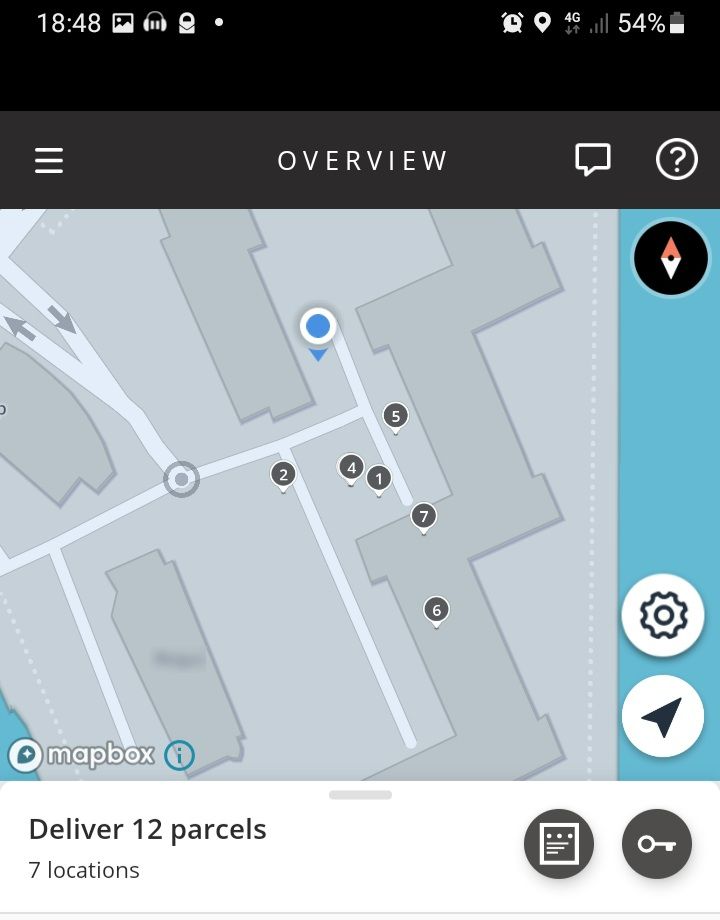
For one stop, I was expected to deliver 12 packages to 7 doors across multiple floors in a block of flats in central Cardiff – the algorithm assigned us around two minutes to do this.
The contractor I worked for understood that the routes were difficult and were forced to compensate for it. They employed drivers to “sweep” from couriers in an area to take their excess parcels and deliver them to ease the burden on workers.
Renting the Plough and Other Fees
Before a new worker can get on the road they must first get hold of a Transit-style van to load up their parcels. Many of the workers I spoke to were forced to rent their van from the company itself to get started – similar to the situation the protagonist in Ken Loach’s latest film, Sorry We Missed You, finds himself in.
The van I used was one owned by the contracting firm and hired at a cost of £840 a month. In effect, the cost of hiring the tools to do the job, when you don’t have a spare van at your disposal, means the first week of every month goes back into the company’s coffers.
All workers I met were registered as self-employed so the contractor could avoid giving sick pay and holiday pay. Nor was there any chance of claiming any form of compensation for an injury sustained on the job.
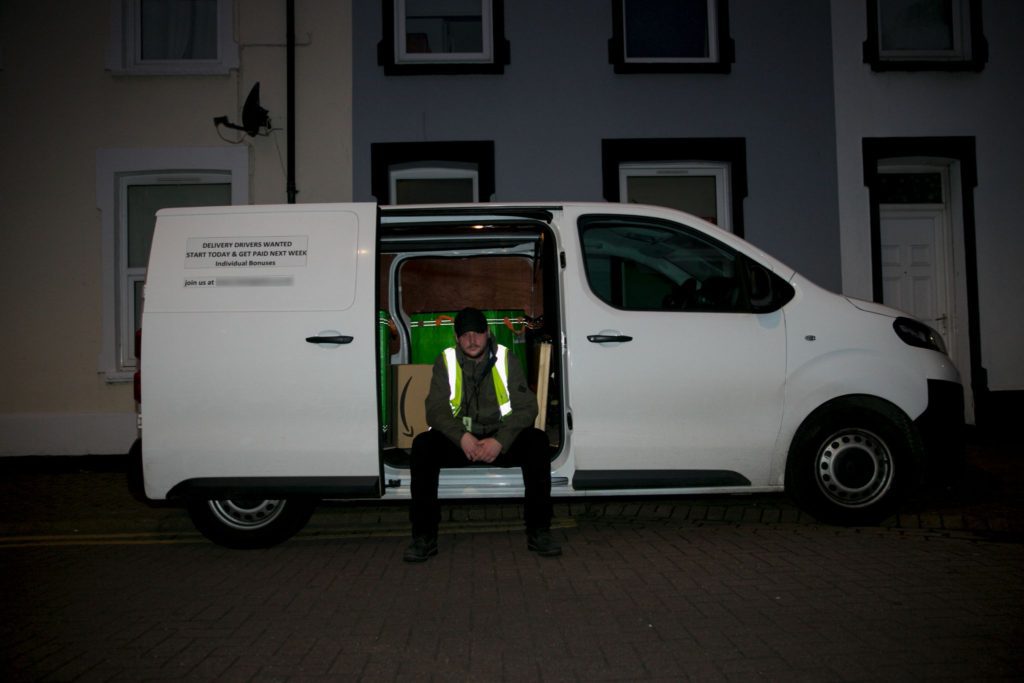
I was given access to a WhatsApp group-chat shared between the drivers and the managers for “problems and issues” on the road. Two couriers posted during their rounds that they had been bitten by the dogs of customers, one having been bitten hard enough on the finger that the dog had drawn blood.
I saw no effort or interest from the managers to address these health and safety concerns.
Although the contractor made no attempt to provide standard payroll services for contracted employees like tax accounting, an “administration charge” was docked from the pay of workers and noted on the invoices.
Constantly on the Knife Edge
No contract means that the firm isn’t obligated to provide you work and you could be let go at any moment. You wouldn’t be sacked as such, but the managers had the right to stop returning your messages asking for shifts for any or no reason.
This gives the managers a convenient stick to beat workers with if they decide to use their right to choose when to work. It leaves workers in a perpetually precarious situation, never knowing when they might be on their last shifts or receiving their last pay cheque.
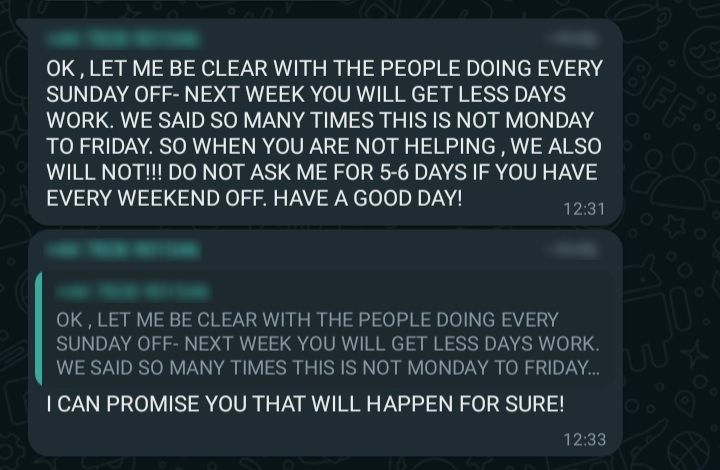
The Sunday routes were, quite understandably, difficult to fill because the drivers wanted to spend time with their families. Managers would berate workers on the WhatsApp chats if they couldn’t fill the shifts. When asked if the firm could provide a higher Sunday pay-rate, workers were told that we could find another job if we wanted to.
Workers were also threatened with being denied a day of work for every “concession” (complaint) they had from a customer, which can be made even by reversing into a customer’s driveway to turn around on a tight road, and for not reattempting the parcels that couldn’t be delivered before going home.
One sequence of messages from a manager at the Swindon depot threatening the drivers ended: “im watching”.
Employee monitoring
All drivers in the firm that we worked for were made to download a separate app to the Amazon delivery tool. The app, called eMentor, is made to constantly monitor a courier’s driving ability, from when they arrive at the depot to when they leave.
It even goes as far as to monitor the harshness of a courier’s braking among other little details of van control, and at the end of each shift a driver is given a score pitted against the rest of the workers.
Workers who struggle with the routes are also lambasted by managers on the depot WhatsApp chats.
A scoreboard of the “Top 5 Performers” and “Bottom 5 Performers” is routinely sent to group-chats for all to see, and workers are either congratulated or shamed in front of their colleagues depending on how much the company has been able to exploit them that day.
Sometimes managers would also leave drivers to hang-out-to-dry in specific categories. With there being so many metrics, drivers are bound to be at the top of some scoreboards and at the bottom of others. Bosses will always have an excuse to tell workers to go faster and work harder.
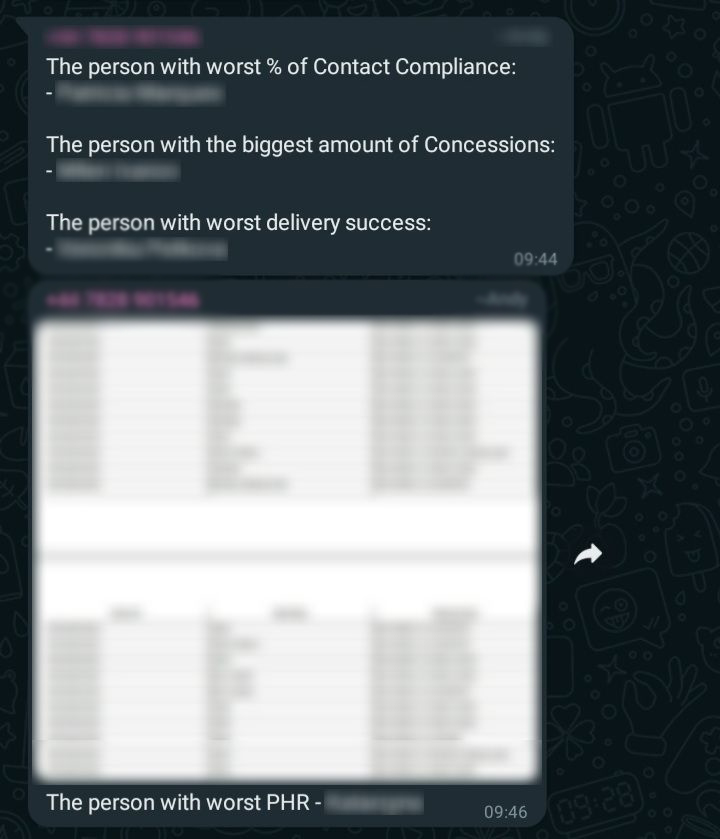
It’s not just a worker’s driving and productivity which is logged and assessed – the honesty of the Amazon couriers is also monitored.
Amazon makes pains to crush the chance of drivers stealing packages from the world’s richest man. I had a parcel buried amongst the deliveries that wasn’t on the route, controlled by an app downloaded onto the driver’s smartphone.
It turned out to be a fake package, quietly inserted into the van in the bottom of a bag of parcels loaded up from the depot. When I asked a manager at the Bristol depot why it was in the load when it wasn’t on the set route they revealed that it was a dummy.
Drivers talked about fake packages being hidden in their loads – a calculated attempt at an underhanded honesty test for new drivers, designed to catch you out if you forget to bring it back to base.
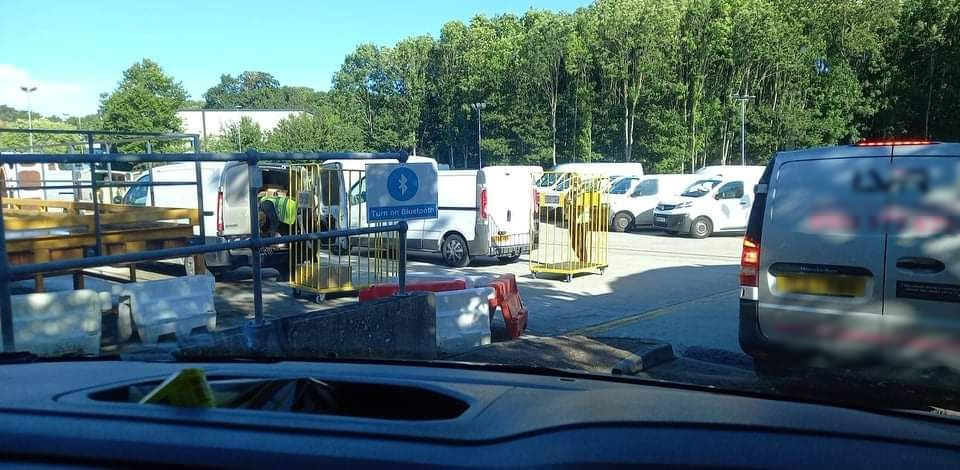
Couriers see only brief glimpses into the world inside the warehouse where the parcel-loads are prepared for transit. They are also subject to leaderboards on large screens displayed to all workers. But voice.wales saw a gross insight into the working conditions on the conveyor belts on the warehouse floor.
WARNING: GRAPHIC CONTENT AHEAD
I had seen warm bottles of urine rolling freely around by packages ready to be distributed to customer’s homes, but there was an even more shocking sight to see.
A courier working a route around Weston-Super-Mare from the Bristol depot got to the bottom of one of their bags and found a horrifying sight. It was what appeared to be human feces with its remnants smeared on the sides of the bag.
These brightly coloured bags can contain around 15 – 30 parcels for one area, all of which may have been contaminated with the human waste shown above. The bags are filled from a conveyor belt that continually spits out packages in a high-intensity factory line.
Given Amazon’s focus on extreme productivity it’s easy to imagine how someone on the warehouse floor could work themselves beyond their limits. Also consider that the company has often come under fire for the severe lack of toilet breaks given to workers.
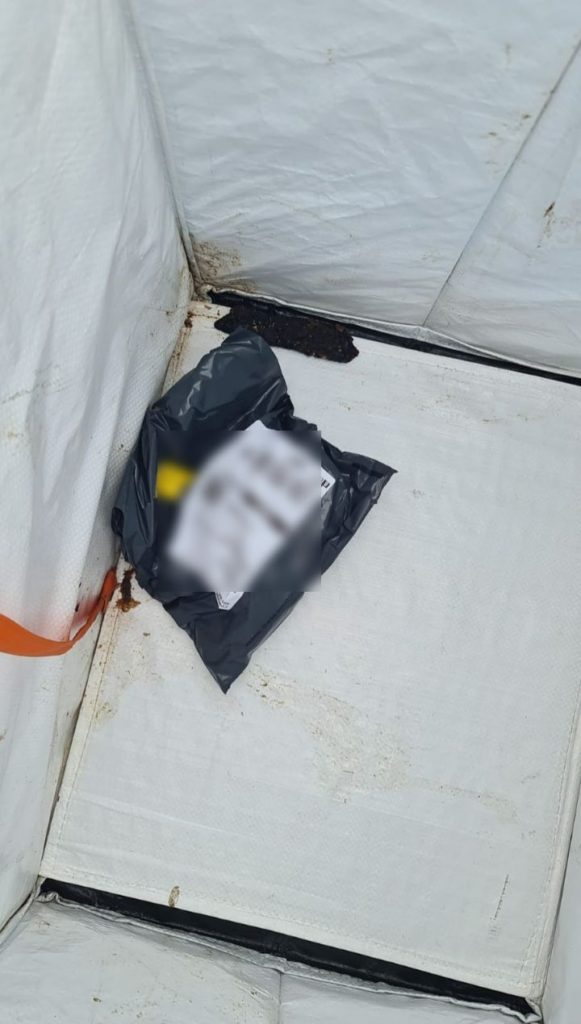
I asked depot bosses who confirmed that this wasn’t the first time this had happened. One Swindon manager, recorded by our undercover journalist, said that whilst working as a courier he once found a used tampon in one of the parcel bags.
However the Bristol boss in charge of the route tried his best to downplay the incident. When asked, again on tape, he said that the stains were just “juice” spilled in the bag. No effort was seen to be made by management to address the issue in front of the workers who had seen the original post.
The GMB trade union has been fighting an ongoing campaign against Amazon bosses for better working conditions for its members. What voice.wales has found reflects the everyday life of many of their members.
Mick Rix, GMB National Officer, told voice.wales: “The conditions Amazon warehouse workers have to endure are horrific and well documented. Those who deliver for Amazon have to suffer the same levels of indignity.”
“Couriers are pushed beyond their limits chasing unrealistic targets – often forced to urinate in bottles in their desperation. Health and safety comes a distant second to profits for the world’s richest company, as management push drivers to do more, faster.”
“Meanwhile they are told they’re self-employed, but without the freedom that affords.”
A spokesperson for Amazon UK said: “We are committed to ensuring drivers are fairly compensated and treated with respect, and this is reflected by the positive feedback we receive from drivers every day.”
“At Amazon, we’re proud to go further than most to ensure drivers are supported in their role. Our sophisticated guidance technology plans delivery routes, advises when to take a break, and ensures that drivers aren’t receiving and driving with too many packages.
“But we don’t stop there. We continue to innovate in order to improve the experience for our delivery service partners and our customers. Drivers also have a number of ways to share their suggestions and experiences, including escalating any challenges to Amazon through a 24/7 hotline.”
The spokesperson ignored a subsequent prompt for comment on the suspected human waste found near parcels in my colleague’s van.
GMB will keep battling Amazon for the recognition of their members, said the union. Rix continued: “A company like Amazon can afford to do better – it’s time to sit down with GMB. Together, we can make Amazon a great, safe place to work.”


